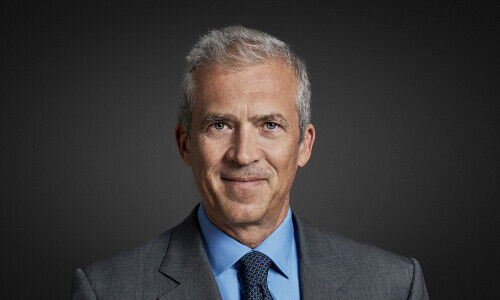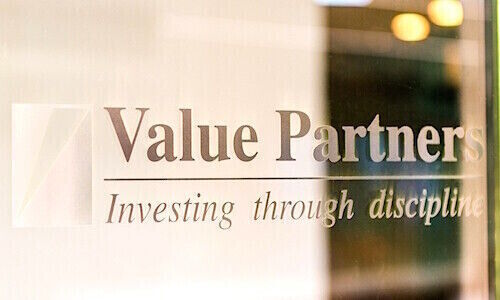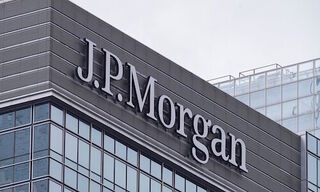To become a member of Vontobel's Board of Directors, Andreas Utermann drove thousands of kilometers himself and gave up his career as a stay-at-home father. In his new role, he hopes to regain the flexibility he had previously lost as CEO. He is approaching next year with respect, he reveals in an interview with finews.asia.
Mr. Utermann, how long have you been familiar with Vontobel?
Since the beginning of my career. You know the name if you work in the financial industry. In the past, I also ran into (CEO) Zeno Staub at one conference or another.
And as a potential employer?
Since April 2020.
It took the Board of Directors a year to decide to hire you.
The Board of Directors, also with the involvement of the Vontobel family, did due diligence with an HR consultancy to look at all possible candidates. The whole thing was done quite professionally and was not a trivial thing during the pandemic.
How did you go about it?
It was difficult, with the different quarantine and travel restrictions. I drove 1,300 kilometers from England to France by car, because in France, if you were vaccinated, you were allowed to move freely. So I stayed in my house and worked in the garden for two weeks and served my quarantine time. Then I drove 1,200 kilometers from France to Switzerland. And then a few days later back again. Completely in accordance with the rules and without cheating.
What tipped the scales in favor of considering Vontobel as an employer?
Four factors. First of all, the idea of working for a family-owned company, because I've always been of the mind that family-owned investment firms are better managed and more successful than others as a result.
«My parents only wanted to go to Switzerland, not Austria, France, or Italy»
Secondly, I had been toying with the idea of having a location for our family in Switzerland for several years. I went here every year with my parents for skiing vacations from a very young age. My parents only wanted to go to Switzerland, not Austria, France, or Italy. That was just the way it was. Over time, friendships have also developed in this country.
Thirdly, I am professionally committed to active investing, and Vontobel, as an investment house, is the best address for this.
The fourth aspect is personal. It's true the work as CEO is super exciting. But if you're honest, you don't have much time left to devote to strategic issues. You're driven by operational work. In this respect, I had hoped that a role as Chairman of the Board of Directors would give me more time to think about strategic issues.
Has that worked out so far?
It's too early to say. This year I visited almost all our Swiss and international sites and numerous customers. I have had many discussions with our employees and shareholders. Of course, this includes my family first and foremost.
How has your view of Switzerland changed?
Switzerland is not completely foreign to me, and I now have a better understanding that Switzerland is a grassroots democracy that has a strong cultural influence on people's behavior and on how they see themselves. I think that's very positive for people's self-esteem. They all feel they are treated equally, regardless of whether they are a Chairman or a salesperson. I was not aware of that.
«However, this was also a war by design»
If you look at «rich» Switzerland from the outside, you might think that it is a very unequal country socially. But the social differences are much smaller than in other countries, as the figures show.
Switzerland frequently sees itself in an exceptional role, standing apart from the EU. How do you perceive this attitude?
The history of Europe since the Second World War has been one of constant reinvention. Right now the war in Ukraine is making Europeans realize that, beyond all differences of opinion, there is something like a community of values that needs to be defended. Switzerland is definitely part of this community of values.
Major changes that are now taking place, are likely to continue for another 10 to 15 years, and will have a decisive impact on politics in Europe and will lead to the EU and countries like Great Britain and Switzerland finding a new relationship with each other and reflecting on their common values. You can already see that in the sanctions policy.
What were your thoughts in February when you heard the Russian army was invading Ukraine?
First of all, I thought it was outrageous that such a terrible war was breaking out so close by. However, this was also a war that was announced. So I was not totally surprised.
What do you mean?
The public signals from British and American intelligence were so clear that one had to assume an invasion. But many people were seemingly not grounded in reality or simply did not want to believe it, including some government leaders, until shortly before the outbreak of war.
Have we experienced a turning point in 2022?
I think so. The reconsideration I mentioned earlier is not only due to (de)globalization, but above all to the war in Ukraine. I read Vladimir Putin's Munich speech from a few years ago from beginning to end.
«I am often surprised that financial markets have such short memories»
I don't think there is a clearer announcement, according to which Russia claims the right to bring the Russian population in the post-Soviet states back into the Russian empire. That is Putin's deepest conviction. This is not a provocation.
The past twelve months have also seen inflation the likes of which we had not seen in decades. Now there is a threat of recession in many parts of the world.
What is your advice now?
Inflation was also a development that gave advance notice. I already pointed out last year in the «Financial Times» that inflation was becoming an issue. I am often surprised that the financial markets have such a short memory and are very slow to learn the lessons of history.
Can you please explain that in more detail?
The last thirty years have been characterized by disinflation, initiated in the 1970s by interest rate hikes of then Federal Reserve Chairman Paul Volcker, resulting in a recession between 1979 and 1981 that ended the inflationary spiral. In parallel, emerging globalization, the growing importance of China, and technological progress fueled economic development.
What followed?
Inflation was not really «defeated» until the mid-1990s when interest rates began to fall at the long end, and the financial markets adjusted their expectations accordingly. In this respect, it is logical that inflation will continue to preoccupy us for some time to come because it has not yet been priced into the market. Expectations from thirty years of disinflation still dominate. The adjustments will take some time, so we are still facing uncertain times.
How do you personally invest your money?
I hold a lot of individual stocks in my portfolio. A year ago I started buying Vontobel products, namely Global Fixed Income Mandates, which I never held before. They also lost value, but I have been buying more. In addition, I am a significant angel investor, with about 40 investments in startups.
«I do not speculate»
Historically, I also have some real estate in my portfolio. Overall, I hold my investments for the long term, and with individual stocks, as soon as they drop 10 percent or more I buy in.
What do you think about gold and crypto?
That's a difficult subject. I don't own gold or crypto. I never have. I'm very traditional about it and don't want to offend anyone who has a different opinion.
What does that mean specifically?
I believe in investments that yield an economic return, i.e. dividends, rental income, or even property rights. Sure, you can also spend your money on gold, crypto, or art. But for me, it's different. I don't like to speculate. Of course, I like to buy art, not because I hope to make money from it, but because I think a painting on the wall is beautiful. I can't do that with gold or crypto.
Cryptocurrencies have been a massive disappointment this year. Do you think they will still become popular as an alternative to money?
I do not speculate. That's why I can't answer that question.
How will you be involved at Vontobel?
As Chairman of the Board of Directors, above all, I assume my control function and scrutinize the strategy. With my background, having worked in the US and Asia, I can contribute strategically to the internationalization of Vontobel's business. I can also apply my knowledge and experience in the area of private market investments, where Vontobel also wants to grow significantly.
«Today, as parents, we are constantly challenged by our children»
Since Vontobel transformed itself from a bank into an investment firm three years ago, I am the first BoD to express this from a career perspective, since I have spent my entire career in the investment industry. Like CEO Zeno Staub, I come from the investment business, and we already speak the same language and don't need another twenty years to get to know each other. We are also quite close in age.
Hearing you talk like that, one gets the impression that the classic Wine & Dine with clients in Private Banking is a thing of the past. Is that right?
Absolutely. I don't want to rule out the possibility that some clients still appreciate going out to dinner with their advisors. But we sense that on an individual basis, what is meaningful, and the sustainability that goes with it has taken on a new importance, which was not the case before. People have changed their moral compass, no matter what the public discussion is.
How do you explain this change?
The pandemic certainly accelerated it, but it was already looming on the horizon and has a lot to do with generational change. Today's children have a different attitude, they are looking for more meaning in life, or «purpose». Previously, parents laid out the rules, and that was it. Today, as parents, we are constantly challenged by our children.
No wonder, since you worked as a stay-at-home dad for two and a half years. Why did you give this up?
It was triggered because my wife couldn't find a part-time job in the financial sector about twenty years ago after the birth of our second daughter. She then started her own business as an interior designer. That went well for a long time, but when our daughters had to pass very important school exams three years ago, it was clear to us that having two working parents was not the best way to go. At the same time, after 18 years at Allianz, I wanted to do something different. At the end of 2019, my appointment as CEO was settled.
How did you organize yourself as a stay-at-home dad?
It was difficult when the pandemic broke out at the beginning of 2020, and the plan didn't go quite as I had imagined. In the UK, we were in lockdown very early on, and my wife was suddenly working from home as well.
«It took me a few weeks to get back up to speed»
On many zoom calls, I was taking care of the daughters' school stuff, but still had a lot of time to myself. It wasn't planned that way. I just sat at home. I decorated the wine cellar and gave the garden a new structure.
Was there also a deceleration?
Yes, definitely. Physically I felt it a lot. I slowed down, having been an extreme «pace worker» before. That was amazing. The first three or four weeks here in my new job at Vontobel were an enormous challenge. It took me a few weeks to get back up to speed. It was like doing sports. If you don't do anything, you lose fitness.
Why didn't you stay a stay-at-home dad?
I probably wouldn't have started working in a company again so early if this unique position at Vontobel hadn't come my way. So many factors came together that suited me as I mentioned at the beginning: Switzerland, the Chairmanship, active investing, and the family in Switzerland. My «mission» was also accomplished insofar as our daughters passed their exams.
What personal values are important to you in your day-to-day work?
For me, integrity is right at the top. That's the absolute top priority for me, which is something my parents passed on to me. It also includes not allowing yourself to be swayed but telling the truth.
«You are responsible for whether they go home happy at night»
I also attach great importance to employees questioning me. I don't want any yes men and yes women around me. I think that a company must be willing to culturally question the status quo. If rules and regulations don't make sense, they should be abolished.
And something else is important to me: I want to have fun at work. That is the normal state for me. I like to laugh, not fun for fun's sake, but because such an attitude radiates energy.
Can you elaborate on that a bit more?
Many years ago, my supervisor gave me the most important piece of advice when he said «never forget what an incredible influence you have as a boss on your employees. You're responsible for whether they go home happy at night and can live out that impact in their family life there, or whether they go home frustrated and transfer bad feelings to the family.» That's what I mean by having fun at work, especially as a boss or Chairman.
Andreas Utermann has been a member of the Board of Directors of Vontobel since April 2021 and its Chairman since April 2022. He was born in Brussels and completed a banking apprenticeship at Deutsche Bank. From 1989 to 2002, he held various management positions at Merrill Lynch Asset Management in London. He then moved to Allianz Global Investors, where his roles included Chief Investment Officer (CIO) and later CEO. He left the company at the end of 2019 to become a stay-at-home father before taking up a directorship at Vontobel in 2021. He holds dual German-British citizenship.

























